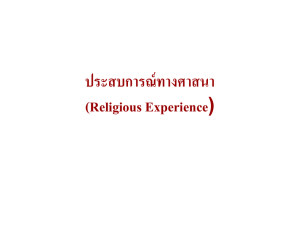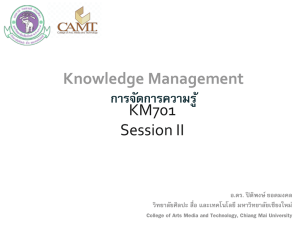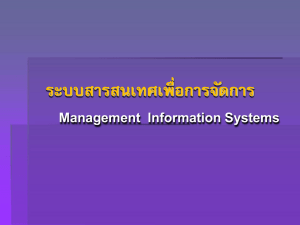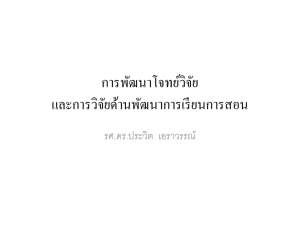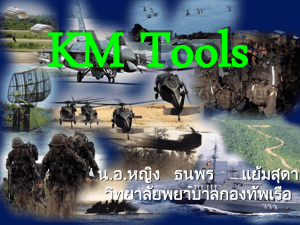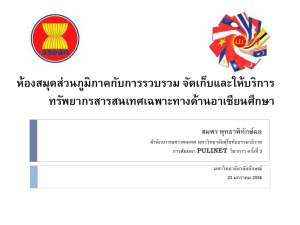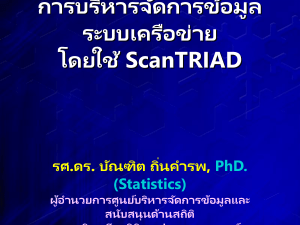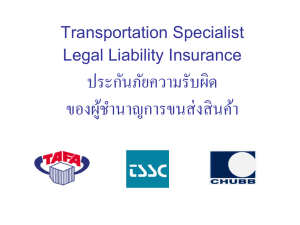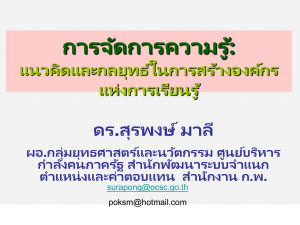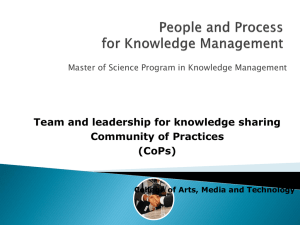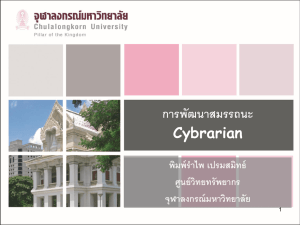What is knowledge? - มหาวิทยาลัยเชียงใหม่
advertisement
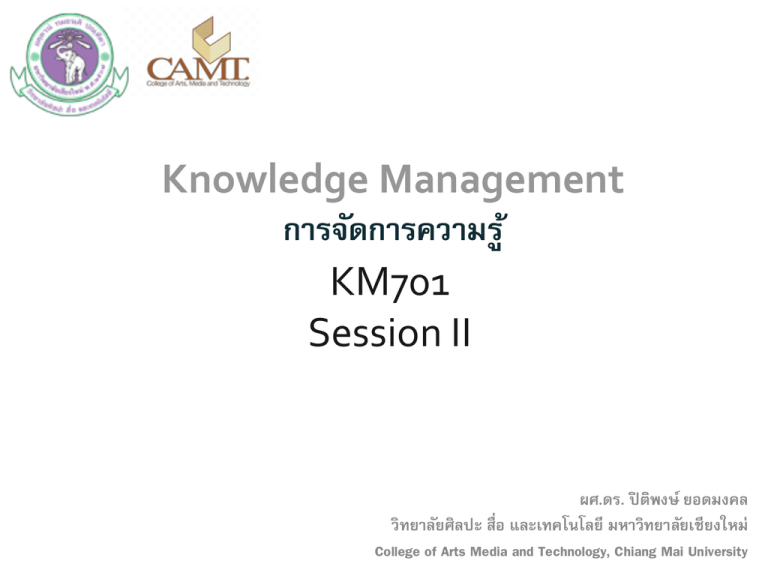
Knowledge Management การจัดการความรู ้ KM701 Session II ผศ.ดร. ปิ ติพงษ์ ยอดมงคล วิทยาลัยศิลปะ สื่อ และเทคโนโลยี มหาวิทยาลัยเชียงใหม่ College of Arts Media and Technology, Chiang Mai University Session II • Why KM – Drivers and problems • Understand Knowledge – What is knowledge – Level of knowledge – Type of knowledge The drivers & problem symptoms WHY IS KM? ทำไมต้ องมีกำรจัดกำรควำมรู้ The drivers& problem symptoms Driver[Org] Problem Symptoms Knowing Yourself - do not know what knowledge needed to know Anti behavior - Defensive - No knowledge package - No sharing - No new knowledge creation Losing knowledge workers Lost: expert knowledge, trade secret, customers, information, income Competitors Respond faster to customers Information Outdate Technology Outdate Short Product Lift Cycle Prosumer, Changing fast Org. Structure No linkage of information, no coordination Process Human error, replete mistakes Environment New paradigm UNDERSTANDING KNOWLEDGE The most critical word in the KM is “Knowledge” WHAT IS KNOWLEDGE? ความรู้คืออะไร? Knowledge ? ดินแดน ลานนา ดินแดน ล้านนา 3+2 = 4 Knowledge? Knowledge Definitions • Understanding gained through experience or study [Awad, M.E. & Ghaziri, H. M.] • Justified beliefs about relationship among concept relevant to the particular area [Frenandez, B. I., Gonzalez, A. & Sabherwal, R.] • ประสบการณ์จริ ง ที่เกิดจากเห็นจริ ง ได้ลงมือปฎิบตั ิทาจริ ง เป็ นความเชื่อที่พิสูตรแล้วโดยการทา จริ ง หรื อมีประสบการณ์ และจะยังคงเชื่อตราบเท่าที่วา่ ใช้ได้จริ ง [ณพศิษฎ์ จักรพิทกั ษ์] Knowledge ความรู ้ (knowledge):ความเชื่อที่พิสูตรแล้วว่าเป็ นจริง Justified True Belief ประสบการณ์จริงที่เกิดจากการเห็นจริงได้ลงมือปฏิบตั จิ ริง ซึ่งเป็ น ความเชื่อที่ได้รบั การพิสูจน์แล้วว่าเป็ นจริง Real experiences, see and practice by oneself. Justified true belief College of Arts, Media and Technology, Chiang Mai University องค์ประกอบของความรู้ • • • • Truth/Fact: ความจริ ง Procedural rule: กฎ ระเบียบ ขั้นตอน Heuristic: บทเรี ยนจากประสบการณ์ Values, Assumptions and Beliefs: คุณค่าและความเชื่อ Tiwana, A Knowledge and others • Intelligence: the capacity to acquire and apply knowledge (ความสามารถในการได้มาและประยุกต์ใช้ความรู้) – Memory: the ability to store and retrieve relevant experience at will (ความสามารถในการบรรจุและเลือกใช้ประสบกราณ์) – Learning: the knowledge or skill that is acquired by instruction or study (กระบวนการที่ตอ้ งใช้ในการศึกษาความรู้ หรื อทักษะ) • Experience: comprises knowledge of or skill of working gained through involvement in or exposure to that thing or even ประสบการณ์ = สิ่ งที่เกิดขึ้นในอดีตที่มีความเกี่ยวข้องกับงาน – Knowledge develops over time through experience, experience leads to expertise. – People use experience to change facts into knowledge • Common Sense: innate ability to sense, judge, or perceive situation; grows stronger over time Tiwana, A Data – Information – Knowledge - Wisdom ข้ อมูล - สารสนเทศ - ความรู้ - ปั ญญา Data: ข้ อมูล • Unorganized and unprocessed fact • 20 Students Information: สารสนเทศ • • • • Organized fact that make decision making easier 20 students boys 13 girls 7 3.96 4.00 2.00 1.75 Knowledge: ความรู้ • Teaching Plan: Team Up – (Top + Low = Group learning 10 semesters) Wisdom : ปั ญญา • Group Teaching Manual • หนังสื อ การเรี ยนรู้แบบทีมของนักเรี ยน ลำดับขั้นของควำมรู้ [knowledge level] Data Information Knowledge Specialized People (Drucker, 1953) Know-how and Know-why (Argyris,1973) Believe and Commitment, Related to Action, Social Values (Nonaka, 1995) College of Arts, Media and Technology, Chiang Mai University Wisdom บริบท Context ประสำนภำพรวม Joining of wholes ปัญญำ Wisdom สร้ ำงภำพรวม ควำมรู้ Formation of a whole Knowledge เชื่อมโยงส่ วนต่ ำงๆ ข้ อมูลข่ ำวสำร Connecting of parts Information สงิ่ ใหม่ๆ Novelty ข้ อมูล รวบรวมส่ วนต่ ำงๆ ประสบการณ์ Experience Data Gathering of parts Cognitive Domain รู้ เข้ ำใจ นำไปใช้ วิเครำะห์ สั งเครำะห์ ประเมินค่ ำ Knowledge Comprehension Application Analysis Synthesis Evaluation Type of Knowledge ประเภทของควำมรู้ Alternative Views of Knowledge Knowledge Objective View Subjective View State of Mind Practice An object Assess to information Capability Fernandez, Gonzalez & Sabherwal Awad, &Ghaziri Type of Knowledge • Procedural Knowledge Shallow Knowledge – Understand process • Declarative Knowledge – General & [short-term memory] • Semantic Knowledge – Accumulated [long-term memory] • Episodic Knowledge – Knowledge from practice Deep Knowledge Nonaka 2006 Tacit VS Explicit Tacit Knowledge Explicit Knowledge
